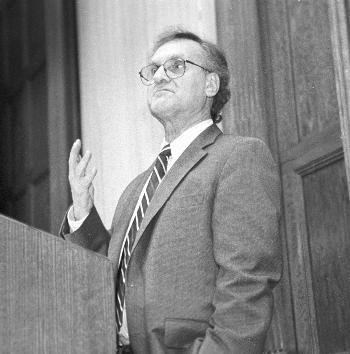
News
Summers Will Not Finish Semester of Teaching as Harvard Investigates Epstein Ties

News
Harvard College Students Report Favoring Divestment from Israel in HUA Survey

News
‘He Should Resign’: Harvard Undergrads Take Hard Line Against Summers Over Epstein Scandal

News
Harvard To Launch New Investigation Into Epstein’s Ties to Summers, Other University Affiliates

News
Harvard Students To Vote on Divestment From Israel in Inaugural HUA Election Survey
UN Special Envoy Decries World Response to AIDS

United Nations Special Envoy on AIDS/HIV in Africa Stephen Lewis told a packed Barker Center lecture room yesterday that the disease has reached “apocalyptic” proportions in Africa and that the world’s response to the pandemic thus far has been “unconscionable.”
The speech, entitled “If AIDS is the Biggest Problem in the World, What Are We Going to Do About It?” was part of AIDS Week, a series of speeches and activities organized by the Harvard AIDS Coalition and several other student groups. Lewis said that the single most insurmountable obstacle in the way of a comprehensive, successful war against the spread of and death rate caused by HIV/AIDS is the lack of allocated funds.
“The biggest problem is the lack of resources,” he said. “The absence of dollars is strangling a continent.”
AIDS is more than just the biggest problem facing the world today, Lewis said—it is the biggest problem that has ever faced humanity. Its victims have outnumbered those of the Black Plague in 14th-century Europe and of the 20th century’s two world wars.
“There has never been such a monumental catastrophe moving in on one continent,” Lewis said. He called the statistics “hallucinatory,” pointing to Botswana as an example. In that nation, the prevalence rate of AIDS among women ages 25-29 is 51.2 percent.
In a continent where the number of new AIDS infections is growing at an alarming rate each year, Lewis said that the problem is no longer how scientifically to fight the disease. Medicines to drastically reduce the mother-to-infant transmission rate are inexpensive to produce and easy to administer, he said. It would be similarly simple, he added, to administer drugs that can prolong the lives of people already infected.
Moreover, organizations exist that could distribute and administer them, Lewis said, adding that hospitals and clinics could treat millions more people across the continent if they had the resources.
Lewis told the audience that United Nations Secretary-General Kofi Annan asked last year for the nations of the world to contribute to a fund that would be allocated to fighting AIDS, tuberculosis and malaria. Annan appealed especially to wealthy nations, asking for a minimum of $10 billion—but since then only about $2.1 billion has come in, Lewis said.
By contrast, a war on Iraq, Lewis said, would cost far more. The Congressional Budget Office has estimated that sending troops and equipment to the Persian Gulf would cost $9-13 billion, followed by $6-9 billion per month to run the war.
“Why is there always money for war and there’s never money for the human condition?” Lewis demanded, slamming his fist on the podium. “Why is war sacrosanct and African lives are expendable?”
Lewis pointed to what he called a “renaissance of young people” happening all over the world as a beacon of hope. Everywhere, he said, young adults are spending time to volunteer in AIDS-devastated countries and to donate whatever they can to the crisis.
“We have to keep the pressure on,” he said.
Want to keep up with breaking news? Subscribe to our email newsletter.
